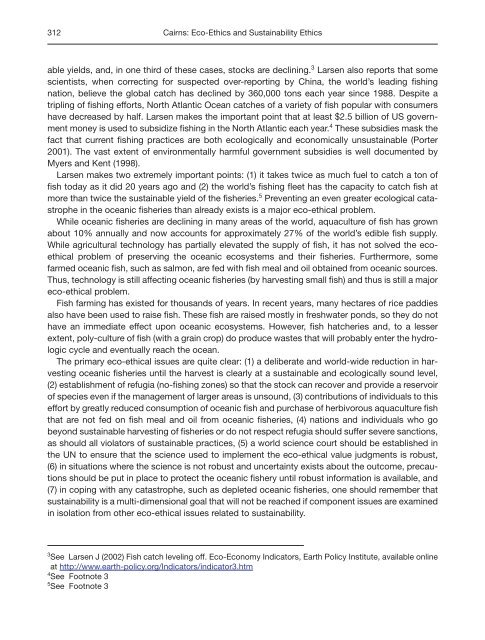View - ResearchGate
View - ResearchGate
View - ResearchGate
You also want an ePaper? Increase the reach of your titles
YUMPU automatically turns print PDFs into web optimized ePapers that Google loves.
312Cairns: Eco-Ethics and Sustainability Ethicsable yields, and, in one third of these cases, stocks are declining. 3 Larsen also reports that somescientists, when correcting for suspected over-reporting by China, the world’s leading fishingnation, believe the global catch has declined by 360,000 tons each year since 1988. Despite atripling of fishing efforts, North Atlantic Ocean catches of a variety of fish popular with consumershave decreased by half. Larsen makes the important point that at least $2.5 billion of US governmentmoney is used to subsidize fishing in the North Atlantic each year. 4 These subsidies mask thefact that current fishing practices are both ecologically and economically unsustainable (Porter2001). The vast extent of environmentally harmful government subsidies is well documented byMyers and Kent (1998).Larsen makes two extremely important points: (1) it takes twice as much fuel to catch a ton offish today as it did 20 years ago and (2) the world’s fishing fleet has the capacity to catch fish atmore than twice the sustainable yield of the fisheries. 5 Preventing an even greater ecological catastrophein the oceanic fisheries than already exists is a major eco-ethical problem.While oceanic fisheries are declining in many areas of the world, aquaculture of fish has grownabout 10% annually and now accounts for approximately 27% of the world’s edible fish supply.While agricultural technology has partially elevated the supply of fish, it has not solved the ecoethicalproblem of preserving the oceanic ecosystems and their fisheries. Furthermore, somefarmed oceanic fish, such as salmon, are fed with fish meal and oil obtained from oceanic sources.Thus, technology is still affecting oceanic fisheries (by harvesting small fish) and thus is still a majoreco-ethical problem.Fish farming has existed for thousands of years. In recent years, many hectares of rice paddiesalso have been used to raise fish. These fish are raised mostly in freshwater ponds, so they do nothave an immediate effect upon oceanic ecosystems. However, fish hatcheries and, to a lesserextent, poly-culture of fish (with a grain crop) do produce wastes that will probably enter the hydrologiccycle and eventually reach the ocean.The primary eco-ethical issues are quite clear: (1) a deliberate and world-wide reduction in harvestingoceanic fisheries until the harvest is clearly at a sustainable and ecologically sound level,(2) establishment of refugia (no-fishing zones) so that the stock can recover and provide a reservoirof species even if the management of larger areas is unsound, (3) contributions of individuals to thiseffort by greatly reduced consumption of oceanic fish and purchase of herbivorous aquaculture fishthat are not fed on fish meal and oil from oceanic fisheries, (4) nations and individuals who gobeyond sustainable harvesting of fisheries or do not respect refugia should suffer severe sanctions,as should all violators of sustainable practices, (5) a world science court should be established inthe UN to ensure that the science used to implement the eco-ethical value judgments is robust,(6) in situations where the science is not robust and uncertainty exists about the outcome, precautionsshould be put in place to protect the oceanic fishery until robust information is available, and(7) in coping with any catastrophe, such as depleted oceanic fisheries, one should remember thatsustainability is a multi-dimensional goal that will not be reached if component issues are examinedin isolation from other eco-ethical issues related to sustainability.3 See Larsen J (2002) Fish catch leveling off. Eco-Economy Indicators, Earth Policy Institute, available onlineat http://www.earth-policy.org/Indicators/indicator3.htm4 See Footnote 35 See Footnote 3















